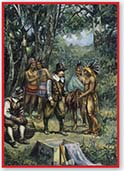American Issues  Connector: Global Interdependence
Connector: Global Interdependence

U.S. firms out-source work to such nations as India and Nigeria.
TRACK THE ISSUE
![]() Is global interdependence good for the American economy?
Is global interdependence good for the American economy?
Like many nations, the United States depends on trade and commerce with other countries to support its economy. Employment is a part of the global economy, as a growing number of U.S. companies outsource jobs overseas. Use the timeline below to explore this enduring issue.
-
1500s Columbian Exchange
Products and ideas are exchanged between the hemispheres.
-
1812 War of 1812
United States goes to war in part to protect its trade rights.
-
1944 World Bank
The World Bank and International Monetary Fund are established at Bretton Woods Conference.
-
1990s World Trade Increases
NAFTA joins the United States, Mexico, and Canada in a free-trade pact, and the World Trade Organization is founded.
-
2000s Globalization Debated
Critics and advocates debate benefits of globalization.

Europeans trade goods with Native Americans.
DEBATE THE ISSUE
Outsourcing Jobs Many American companies send work overseas where wages are lower. This is called outsourcing. In the past, most of the jobs lost through outsourcing were factory jobs. Now, office work and computer jobs are being sent abroad, too. How does outsourcing affect America?
“Sending jobs overseas is part of corporate America’s quest for short-term profits at the expense of the well-being of our workers. In effect, forcing the middle class to compete with the cheapest foreign labor can only result in a decline in our nation’s standard of living and a diminished quality of life.”
—Lou Dobbs, News Anchor, CNN
“Will [the outsourcing of services] lead to jobs going overseas? You bet, but that is not a disaster. For a start, America runs a large and growing surplus in services with the rest of the world. The jobs lost will be low-paying ones…. By contrast, jobs will be created that demand skills to handle the deeper incorporation of information technology, and the pay for these jobs will be high.”
—The Economist magazine
 TRANSFER Activities
TRANSFER Activities
- Compare How do these two views on outsourcing differ?
- Analyze Do you think either Lou Dobbs or the writer in The Economist would have considered the Columbian Exchange a danger to European or Native American economies? Explain.
- Transfer Use the following Web site to see a video, try a WebQuest, and write in your journal. Web Code: neh-6102




